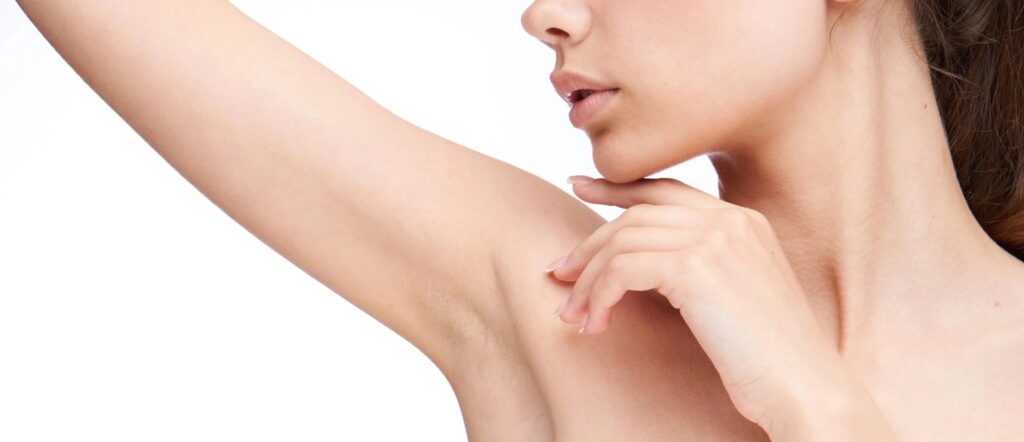Body odour is also known as bromhidrosis. Sweat does not have a distinct odour. Body odour is caused by bacteria that live in sweaty areas of your body. Bacteria aren’t the only odoriferous culprits. It is also dependent on which sweat glands are sweating. In your skin, you have two types of sweat glands: eccrine glands and apocrine glands.

Bacteria thrive in moist environments, such as your armpits. When you sweat, bacteria convert certain proteins in your sweat into acids. So it’s not the bacteria themselves that stink. It’s a byproduct of bacteria.
Body Odor and Its Causes
Around puberty, the rise of androgens, or male hormones, causes body odour to appear. These hormones are dormant until puberty. That’s why body odour isn’t an issue when you’re a kid. Men, on average, have more problems with body odour than women because they sweat more.
A number of factors can exacerbate body odour once these hormones are active, including:
- A lot of physical activity
- The weather is warm or hot.
- As a result of being overweight, hormones change.
- Health conditions include diabetes, liver disease, and kidney disease.
- Due to some medication.
- Foods with strong odours, such as garlic, curry, and onions, can seep through your pores.
Where Does My Body Odor Come From?
While most people associate body odour with the armpits, bacteria can cause odour in the groyne, anus area, upper thighs, and feet as well. Body odour can be avoided by washing your skin thoroughly with a wet washcloth and soap, especially in areas where you sweat a lot.
Stale shoes can be caused by stinky feet. It may be beneficial to use an over-the-counter deodorizer on your shoes. Wear thick, absorbent socks if at all possible.
Getting Rid of Body Odor
There are a few things you can do to help manage body odour if you have a problem with it:
Mix hydrogen peroxide with water to get rid of body odour. 1 cup (8 ounces) water + 1 teaspoon (3 percent) hydrogen peroxide Wipe the affected areas with a washcloth (underarms, feet, groyne). This could help to get rid of some of the bacteria that cause odour.
If sweat from working out is your main source of body odour, wash your workout clothes frequently. Sweaty gym clothes are a bacteria breeding ground.
Change the way you eat. Foods that cause a bad odour in the body should be avoided. Consult a doctor or a dietitian before making any major dietary changes.
If you suffer from excessive sweating, see your doctor (hyperhidrosis). There are a few options for those with more severe sweating who want more aggressive treatments.
Certain medical conditions can also cause excessive sweating. Your doctor will be able to determine the cause of your symptoms and treat you accordingly.

What you can do to reduce body odor
Take a bath or shower every day.
Regularly wash your clothes and only wear clean ones.
Foods with a strong odour should be avoided because they can seep through your pores.
Before going to bed, use an antiperspirant. This enables the product to work while you sleep and aren’t sweating. Antiperspirants that are applied after showering in the morning will be washed away by sweat, leaving you vulnerable to daytime sweating. Deodorants do not make you sweat less. They’re mostly used to cover up the smell of sweat on your skin. Antiperspirants are chemical compounds that reduce sweating.
Maintain a constant level of moisture in your underarms. Bacteria struggle to reproduce in dry body parts. Shaving your underarms on a regular basis can help reduce sweat and odour while also preventing bacteria buildup.
Use Deo in armpits, underarms and areas where you sweat most.
We all want to smell nice, and some of us go to great lengths to do so. However, maintaining good hygiene is only half of the battle.
What you eat, how you feel, and your level of activity all play a role in the odour cocktail of sweat and bacteria you produce. Because body chemistry differs from one person to the next, it’s understandable that we’re all affected differently.
Some useful tips to reduce body odor
#1. STRESS REDUCTION
It’s a thing that “stress stinks.” When you’re stressed or anxious, your body responds by sweating to keep you cool. Worrying about how much sweat you’re producing can actually make you sweat even more! When you’re stressed, your pits sweat 30 times more than when you’re not.
Because of its different composition, stress sweat can actually have a stronger odour than regular sweat. The eccrine glands produce sweat, which is mostly water, as a result of exercise or rising temperatures. Stress sweat is pumped out by the apocrine glands and contains protein and fat, as well as bacteria, which are all over it because adrenaline is involved in stressful situations.
So take a few deep cleansing breaths, do some yoga, pare down your schedule to make it more manageable, and listen to music that inspires you… Make every effort to reduce your stress levels. You will feel and smell better as a result of this treatment.
#2. ALLOW TIME AFTER EXERCISE TO COOL DOWN
Why are you still red in the face and sweating two hours after you completed your run? Exercise raises your core temperature, which is especially important if you’re exercising outside on a hot, humid day. The more you do to intentionally cool down, the less sweating you will produce.
Allow yourself plenty of time to gradually lower your heart rate, drink plenty of water, and stretch. If you’re still hot, stand in front of a fan, place a cool water bottle against the back of your neck, and take a cool shower with a high-quality soap like Natural Soap for Face & Body, which gently cleanses without harsh ingredients.
You’ve just asked a lot of your body to do a lot of work for you. Allow time for the gears to shift.
After you’ve cooled down, try Deodorant Wipes, which are a great way to apply for long-lasting deodorant protection after a workout when you don’t have time or don’t want to shower.
#3. BODY HAIR SHOULD BE REMOVED OR REDUCED TO FIGHT BODY ODOUR.
This is, after all, a very personal subject. Your body is beautiful in its current state. Hair, on the other hand, contributes to body odour because it grows in all of the locations where the odour-producing apocrine sweat glands are located. Bacteria can grow on a larger surface area with more hair.
Hair absorbs and traps odours, as anyone who has ever sung Kumbaya around a smoky campfire will attest. Consider a trim here and there if the odour is a recurring issue for you. It isn’t necessary to completely remove hair.
#4. ELIMINATE THE USE OF ANTIPERSPIRANTS TO FIGHT BODY ODOUR
It may seem absurd, but it is correct. The armpit has been dubbed the body’s “tropical forest,” and there’s already a lot of fertile ground in such a small space.
Antiperspirants, on the other hand, can increase the number of bacteria species in your armpit if you use them long enough. Antiperspirants, in particular, can boost the number of bacteria that cause odours. It can also turn your shirt’s armpits yellow. Visit this blog for more information on the benefits of avoiding aluminium.
Deodorant for Underarms & Private Parts, on the other hand, works by preventing odour-causing bacteria from feasting on bodily fluids, preventing them from reproducing. Get rid of your deodorant!

#5. USE LESS SPICE TO FIGHT BODY ODOUR
You definitely smell like what you eat, if you are what you eat. Not only do strong-smelling foods produce strong-smelling bodies, but they also produce strong-smelling breath.
Do you like spicy foods like curry or salsa that make you sweat?
Body odour is more likely to be caused by foods that make you sweat more. Sulphur compounds in curries, cumin, garlic, and onions all release gases as they are broken down by your body. These gases, along with sweat, pour out of your pores for several hours after you eat, leaving an odour behind.
#6. REDUCE THE AMOUNT OF REFINED SUGAR IN YOUR DIET TO FIGHT BODY ODOUR
Reduce sugar in your diet.(Does it count if you do it several times per day?) That’s something bacteria, particularly the bacteria in our gut, have in common with us. Your digestive system may not be working properly if your gut flora is out of whack, which can result in some strange odours.
What’s the remedy? Reduce your consumption of refined sugars and increase your intake of probiotics such as kefir and Greek yoghurt.
#7. CONSUME A HEALTHY DIET TO FIGHT BODY ODOUR
Body odour can be caused by vitamin and mineral deficiencies, so eating a well-balanced diet rich in fruits and vegetables can help you smell better. Chlorophyll, which is found in green vegetables, is thought to help with body odour. Adding more vegetables to your diet is a no-brainer.
Some vegetables, particularly the cruciferous family, can actually produce odour. Broccoli, cabbage, and brussels sprouts are among the culprits, as are other vegetables that leave a lingering odour in your home when cooked. If you have a problem with these, you may want to reduce your intake. However, you might decide that the health benefits (and delicious flavour) outweigh the risks.
#8. REDUCE YOUR RED MEAT CONSUMPTION
Do you ever get shivers when you’re eating meat? The amino acids in red meat leave a residue in your intestines during digestion, making your body work harder to digest it, which can cause you to sweat. Because the sweat contains enzymes that help break down the residue, the odour is stronger.
It’s important to eat red meat in moderation, especially if your body is sensitive to it.
#9. STOP CIGARETTE TO FIGHT BODY ODOUR
Nicotine releases acetylcholine, a chemical that elevates your body temperature, heart rate, and blood pressure when you smoke. This causes your body to turn on the cooling system and begin sweating, providing bacteria with a feast. Night sweats and hot flashes may be exacerbated by nicotine.
When you stop smoking, you may experience a temporary increase in sweaty episodes. Long-standing habits are difficult to break, but your body will appreciate them.
#10. DRINK LESS COFFEE TO FIGHT BODY ODOUR
For a couple of reasons, your morning coffee not only gives you the boost you need, but it also gives your sweat glands a little boost. Caffeine stimulates the central nervous system by causing the release of adrenaline, which causes you to sweat.
Hot drinks also raise your body temperature, causing you to sweat to cool down. Caffeine should be consumed in moderation, and cold coffee drinks should be considered to prevent excessive sweating.
#11. DRINK ALCOHOL IN REDUCED QUANTITIES
When you drink, the alcohol in your blood causes your blood vessels to dilate, raising your skin’s temperature and signalling your body to start sweating to cool down. Diabetic acid, which is produced by sweating and has a distinct odour when it comes into contact with bacteria, is a byproduct of this process.
Most people only experience this when they are inebriated, so knowing your limits is essential. Alcohol can cause hot flashes and night sweats, just like nicotine and caffeine.
#12. INCREASE YOUR WATER CONSUMPTION
Have you ever noticed that if you don’t drink enough water, your pee smells stronger? Drinking plenty of water flushes toxins and waste out of your system, as well as masks the unpleasant odours they produce.
The sophisticated cooling system in your body works by releasing heat by expanding blood vessels near the skin’s surface. When you’re dehydrated, a higher temperature is required to cause blood vessels to dilate, so you stay hotter. Plus, it’s getting hotter. You’ll also be more dehydrated if you sweat more. Crazy.
#13. SLEEP ON COTTON SHEETS AND WEAR COTTON
PJ’S Microfiber sheets and fleece pyjamas are all the rage and feel super soft to the touch, but synthetic fibre fabrics don’t breathe well and will cause you to sweat more during the night.
Natural fibre fabrics, such as cotton and linen, are breathable and moisture-absorbent. They assist in maintaining a cool and dry sleeping environment by regulating your core temperature. Cotton sheets and pyjamas dry faster and allow for a better night’s sleep, even if you have night sweats. Click here for more information on how different fabrics affect our body odour.
Sweat is a good thing because it is our bodies natural response to prevent overheating. However, it is capable of causing issues.

Body Odor Medical Treatments
If you’ve tried everything to reduce body odour and still aren’t seeing results, consult your doctor. You might have something else going on that needs to be addressed (a fungal infection, for example). Or, you may simply require a stronger treatment to control body odour.
Here are some possibilities;
Prescription antiperspirants/deodorants are more potent than over-the-counter antiperspirants and are typically used as the first line of defence against body odour.
Antibiotics, both topical and oral, can aid in the reduction of bacteria on the skin.
Botox inhibits the ability of your eccrine glands to produce sweat. However, this is not a permanent solution, and treatment must be repeated every few months.
Hair follicles are reduced by laser treatment, but this may not help with B.O.
In severe cases, surgery to remove sweat glands is performed.
When should you contact a doctor?
What sweating and odour symptoms should you be concerned about?
Even when not physically active or in a warm environment, frequent sweating or sweat-soaked clothing
Sweating so profusely that it makes it difficult to do things like hold a pen, turn a doorknob or use a computer.
Sweating while sleeping Skin that is constantly wet.
Infections of the skin in sweaty areas of the body.
A fruity body odour could be a sign of diabetes.
A body odour that smells like bleach, could indicate liver or kidney disease.
A sudden increase in sweating or a change in body odour.
Disclaimer: The author’s views are his or her own. The facts and opinions in the article have been taken from various articles and commentaries available in the online media and Eastside Writers does not take any responsibility or obligation for them.
Note: Contact our Writers at www.eastsidewriters.com for writing Blogs/Articles on any niche. We have experts in various domains from Technology to Finance and from Spirituality to Lifestyle and Entertainment.







Pingback: Pheromones And Arousal - The Body's Natural Way Of Calling - Eastside Writers
Pingback: Is it good to go nude and sleep without your clothes on?